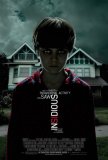Insidious (United States, 2011)
April 02, 2011
If there's a complaint to be made about Insidious, it's that the film's second half is unable to live up to the impossibly high standards set by the first half. This isn't unusual when it comes to films that include a "reveal"; even Jaws lost a share of its potency once the shark emerged as more than a shadowy underwater menace. For nearly an hour, Insidious is as unsettling a horror movie as I have seen in recent years - taut, atmospheric, creepy, and at times downright scary. Director James Wan keeps the viewer on edge, always expecting the next "boo!" moment. Every pixel of the digital print oozes dread. Around the mid-way point, we are provided with explanations and things that were mysterious become more concrete. After that, nothing is quite as intense. The final 45 minutes of Insidious get the job done - that is to say, they resolve the story (at least to the extent that any horror movie wraps things up) - but they are not the equal of what comes before them.
A strength of Insidious is the seemingly mundane nature of the family into whose life this horror intrudes. The movie takes a little time allowing us to get to know them in relatively normal circumstances. There's Josh Lambert (Patrick Wilson), the dad, whose job as a teacher demands him to work long hours. Renai (Rose Byrne), the mom, has all-but-given up a songwriting career to raise their three kids: Dalton (Ty Simpkins), Foster (Andrew Astor), and baby Calli. The family has recently moved into a new house and they are subject to all the stresses associated with such a major life-change. Josh, despite being a loving and attentive husband/father when he's around, is spending longer hours than ever away from home, and Renai is becoming increasingly run-down from the difficulties of setting up the new house and caring for the kids. Tragedy strikes when, one night, Dalton falls and hits his head. Although initially okay, he slips into a coma during the night. His parents find him in that state the next morning and, three months later, the situation has not changed. As bad as circumstances with Dalton are, they're not the worst for the Lamberts. Strange noises, movements half-glimpsed out of the side of an eye, and voices heard through a baby monitor convince Renai that he house is haunted, and whatever is causing the haunting is a malevolent force.
Wan's inventive use of camera angles (which include hand-held and point-of-view shots) draws the viewer into the story. It's not as immersive as the pseudo-reality horror films like Paranormal Activity, but it's sufficient to elevate the level of tension. The color is heavily desaturated, making the movie almost black-and-white. The "boo!" moments, which are numerous, are expertly crafted and aren't as cheap or theatrical as is sometimes the case in horror movies. Best yet, Insidious does not feel like an R-rated horror film that was neutered to get a PG-13 rating. This kind of ghost tale doesn't demand gore; it works on atmosphere and story. Wan is best-known for Saw, which had as much atmosphere as Insidious, but more graphic horror elements. Here, working from a screenplay by Leigh Whannell (who co-wrote Saw with Wan and has a supporting role here as a paranormal investigator), he proves that he doesn't need the blood and viscera to generate psychological horror.
We believe in the characters, chiefly because they do not act like the script-driven mannequins who inhabit garden-variety horror films. They act intelligently, which is a rarity. When, after one particularly bad night in the house, Renai announces that they must leave, that's what they do. They get help. They consult experts. We respect the characters because, for the most part, they respond as we might in their circumstances.
To a degree, Insidious is unsettling because it features a child in danger; that plot element may give some viewers pause. It makes the film grimmer than might otherwise be the case. (There is a similar vibe in Paranormal Activity 2 with the baby). Elements recall The Exorcist and just about every haunted house movie ever made. In this case, though, the Exorcist isn't a priest; it's a psychic, Elise (Lin Shaye), who has a connection to Josh's mother, Lorraine (Barbara Hershey). Actually, Elise's arrival heralds the end to the best Insidious has to offer, because she is able to explain. Sometimes, ghosts are better left ambiguous with inscrutable motives. The fact that the chief apparition in Insidious raises associations with Tiny Tim (the novelty performer, not the Dickens character) and Darth Maul is unfortunate.
Watching Insidious, I was reminded of David Lynch's Fire Walk with Me (and its TV predecessor, Twin Peaks). Iconography Lynch employed for the "weirder" aspects of the Laura Palmer murder mystery are echoed in some of the things Wan does here. Aspects of Insidious recall Twin Peaks' Black Lodge and BOB, and the ending bears more than a passing resemblance to the way in which the Twin Peaks series concluded. Whether intentionally or not, Insidious would seem to owe a debt to those products of Lynch's twisted imagination.
Insidious is a different sort of horror film from the usual genre fare. It is more geared toward intelligent, patient viewers than teenagers in search of a quick, graphic fix. It's not cut from the cookie-cutter mold and that makes it a harrowing, if uneven, experience. Those who appreciate movies that can exploit the feelings of unease they generate will like what Insidious has to offer.
Insidious (United States, 2011)
Cast: Patrick Wilson, Rose Byrne, Barbara Hershey, Ty Simpkins, Andrew Astor, Lin Shaye, Leigh Whannell, Angus Sampson
Screenplay: Leigh Whannell
Cinematography: David M. Brewer, John R. Leonetti
Music: Joseph Bishara
U.S. Distributor: Filmdistrict Distribution
U.S. Release Date: 2011-04-01
MPAA Rating: "PG-13" (Violence, Profanity)
Genre: HORROR
Subtitles: none
Theatrical Aspect Ratio: 2.35:1

Comments